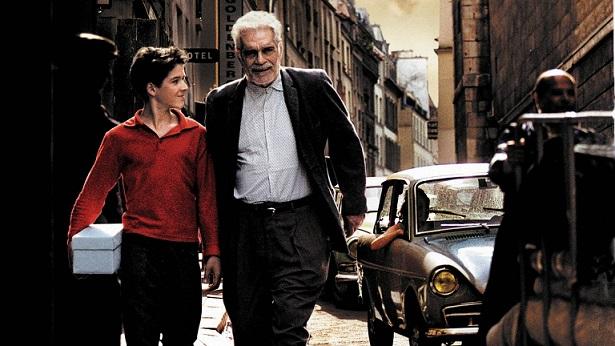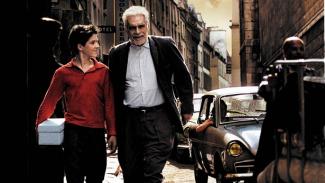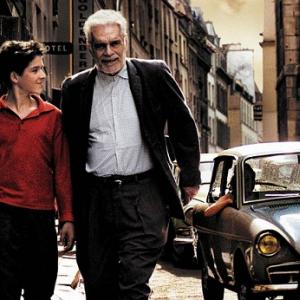Omar Sharif shines as Ibrahim
Pierre Boulanger and Omar Sharif star in “Monsieur Ibrahim” from Sony Pictures Classics.
Monsieur Ibrahim (France, 2003, Sony Pictures Classics, Blu-ray, R, 95 min.). This wonderful film tells how a chosen relationship can be more rewarding than a familial one, as a young French boy bonds with the Turkish grocery store owner across the street.
The Jewish lad is Moses “Momo” Schmidt, age 8, although he tells the many streetwalkers he is 16, as he tries for his first sexual experiences. Momo also is trying to date neighbor girl Myriam (Lola Naymark). Momo is winningly played by Pierre Boulanger (“Nos 18,” “Monte Carlo”). He lives with his father, whose cruelty is more ignoring Momo or comparing him to an older brother, whom we learn later does not actually exist. Momo’s mother has long left the scene.
In addition to shopping at Muslim Ibrahim Deneji’s store, Momo also steals the occasional item to stretch his funds. As they begin to talk to each other, Ibrahim (Omar Sharif of “Lawrence of Arabia,” “Doctor Zhivago,” “Funny Girl”) tells Momo he knows he steals from him, but prefers that to stealing from anyone else. He also tells Momo how to secretly feed his father cat food and stale bread as if they were luxuries. Ibrahim often quotes from his beloved Koran.
Halfway through the film, Momo’s father (Gilbert Melki) abandons Momo, writing in a letter that he is not fit to be a father. By this time, Momo and Ibrahim have been sharing Sunday walks and the occasional meal or ice cream cone. When news arrives that Momo’s father has been found dead, Ibrahim decides to adopt Momo. He the buys a red convertible, learns to drive and the two set off on a road trip to Ibrahim’s hometown in Turkey.
The movie was directed by Francois Dupeyron (“La chambre des officiers”), based on a book and play by Eric-Emmanuel Schmitt. The moments when the two main characters come to know each other make the film shine.
The sole extra is an audio commentary by Sharif, who was 71 when the film was made. Sharif died in 2015. Sharif won the Cesar Award for best actor for his performance and a Venice Film Festival best actor award, while the film was nominated for a Golden Globe. Boulanger won for Best Male Performance at the Chicago International Film Festival. Grade: film 3.5 stars; extra 2.5 stars
Rating guide: 5 stars = classic; 4 stars = excellent; 3 stars = good; 2 stars = fair; dog = skip it
Bon Voyage (France, 2003, Sony Pictures Classics, Blu-ray, PG-13, 115 min.). Jean-Paul Rappeneau's action comedy is set in the early days of World War II, when the Nazis were invading France and about to take over Paris, leading to an exodus of the affluent south to the river city of Bordeaux.
We first are introduced to actress Viviane Denvers (Isabelle Adjani, who played the Brigitte Bardot-like actress who films a commercial on Ibrahim and Momo’s street in “Monsieur Ibrahim”), who will do or say anything, including sleeping with anybody, to further her career and later to save her life. She is followed home from the debut of her new film by a man she has been involved with in the past. The man ends up dead and she calls an old flame (Grégori Derangère of “Black Box” as Frédéric Auger) to get rid of the body.
They stick the body in the trunk of the man’s car, which Auger then drives off, planning to leave in a river. However, there is a heavy rainstorm and the windshield wipers stop working, causing a crash and Auger being arrested for murder when the body is found. This is important because, as the Nazis enter the city, all the prison inmates are being relocated. Auger gets cuffed to inmate Raoul (Yvan Attal of “Rush Hour 3”), who pulls Auger into his successful escape attempt. Both then travel separately to Bordeaux.
On the train, Auger meets a young university physicist Camille (Virginie Ledoyen), who is the assistant to Professor Kopolski (Jean-Marc Stehle), who has created large bottles of heavy water, which is needed for nuclear experiments, that he wants to somehow get to England. The Nazis, helped by a spy who is easily guessed at due to his accent and last name, know about the heavy water and are determined to get it, no matter how many die in the process.
While there are several action scenes, particularly towards the end, the most fun one is when the nephew of the man Denvers killed sees his presumed-killer Auger in a Bordeaux hotel restaurant and the chase overturns several tables of food. By the way, Auger had been unexpectedly invited to lunch by Denvers’ current man, Jean-Etienne Beaufort (Gerard Depardieu, who starred in director Rappeneau's “Cyrano de Bergerac”), a harassed cabinet minister. Some ministers urge collaboration with the Nazis, but Beaufort commands a car and Denvers joins him as they go to Bordeaux.
The entertaining film’s comedy mostly comes in its twists and turns, helped by a lot of coincidences. What viewers may find unsettling, or at least odd, is the cigarette smoking in the Patis movie theater. The soul extra is an audio commentary by director Rappeneau. Grade: film 3.25 stars; extra 2.5 stars
Lilies Not for Me (United Kingdom, Gravitas Ventures, Blu-ray, NR, 96 min.). Written and directed by Will Seefried (TV’s “Sink Sank Sunk”), this film was not what I was expecting as the jacket refences “a gay novelist tells his psychiatric nurse the story of a relationship with an old friend which spiraled out of control when they turned to a risky procedure to cure their forbidden feelings for one another.” It turns out the film is more of a thriller, with being homosexual almost worse than being a murderer.
The novelist (Fionn O’Shea of “Handsome Devil,” TV’s “Normal People” as Owen James) lives in seclusion in the countryside, working on his second novel. One day his university friend from 15 years ago shows up at his door. The friend (Robert Aramayo as Philip) used to be a love interest of Owen’s, who has accepted his homosexuality and the fact that it probably will never be acted on. However, Philip, now a doctor and aware that he had some attraction for Owen, says he has found a cure for their wayward emotions and asks Owen’s help to accomplish the cure.
At this point some background from the film’s closing would be helpful. In the 1910s and 1920s, there was a doctor who pushed testicular transplants as a cure for homosexuality, and that is what Philip wants Owen’s help with. That real-life doctor was nominated six times for the Nobel Prize, until his method was discredited.
Owen reluctantly agrees to help Philip, but only if they first are together. This leads to some nice moments in the film. Unfortunately, a drunk man, who used to live at the cottage, shows up, and Philip uses him as his donor. While the man dies, Philip says he is cured, but continues to stay on at the cottage.
Things become more complicated when the dead man’s son Charlie (Louis Hoffman) shows up, looking for dad. Charlie, despite being married and having a very young son, is at least bisexual and often visits a gay bar in his neighborhood. There is attraction between Owen and Charlie, which it seems Philip resents, but which presents some nice moments in the film.
All this is told in flashback to Owen’s nurse Dorothy (Erin Kellyman) as he is in a psychiatric asylum where they are trying to cure him of his homosexuality.
The film is beautifully lensed and has scenes both beautiful in emotion and horrifying. Both depicted means of trying to cure homosexuality are cruel and at least one has been discredited, although conversion therapy is still used. Grade: film 3.25 stars
Sadie McKee (1934, Warner Archive Collection, Blu-ray, NR, 93 min.). There is a trio of love interests in this Depression-era film as well, as three men are enamored of Sadie McKee (Joan Crawford of “Mildred Pierce,” “Whatever Happened to Baby Jane?”). The first and longest admirer is Michael Alderson (Franchot Tone of “Mutiny on the Bounty,” “Dangerous,” who soon became Craford’s second husband), son of the wealthy family Sadie’s mother works for as a cook. Tommy Wallace (Gene Raymond of “Mr. & Mrs. Smith”), Sadie’s first love with whom she moves to New York City and plans to marry, until he stands her up by going off to be a singer with performer Dolly Merrick (Esther Ralston of “Peter Pan”). The third is wealthy Jack Brennan (Edward Arnold of “Diamond Jim,” “You Can’t Take It with You”), whom she meets while working as a nightclub dancer and marries.
By then, Michael is Brennan’s lawyer, who warns Brennan not to marry her, as she may just be after his money. (He has $17 million.) Brennan’s butler is played by Leo G. Carroll (TV’s “The Man from U.N.C.L.E.”). Earlier, Michael’s family had dismissed Tommy for dishonesty, which is why she ran off to New York with Tommy, feeling Michael had let her down by not forgiving Tommy.
Sadie’s life has plenty of ups and downs, including her efforts to stop husband Brennan from drinking and a sad return of Tommy into her life. The film’s ending is rather abrupt.
Extras include three Merrie Melodies cartoons: “Pop Goes Your Heart” (6:42); “Shake Your Powder Puff” (6:20); and “Why Do I Dream Those Dreams?” (6:59). Grade: film 3.25 stars; extras 2 stars
The Four Horsemen of the Apocalypse (1921, Warner Archive Collection, Blu-ray, NR, 134 min.). This is the silent film that made Rudolph Valentino a star. This version is the beautiful 1993 restoration of the Rex Ingram classic adaptation of the Vicente Blanco Ibanez’s novel.
Valentino (“The Sheik,” “The Son of the Sheik”) plays Julio Desnoyers, the libertine son of a wealthy Frenchman living in Argentina. After his mother and her sister each receive half of their father’s vast estate, the two families decide to move back to Europe, with Julio’s family in Paris – although they buy a castle in the Marne – and the other half moving to Germany, where Julio’s three cousins would eventually fight for the Germans in World War I.
Julio has taken up painting women and is known for his dancing the tango in local clubs. He soon falls for married Marguerite Laurier (Alice Terry of “The Prisoner of Zenda”).
The film is lifted by its war scenes, including the Germans’ takeover of the Marne castle and the fighting to liberate it, as well as a red-tinged fantasy sequence that shows the Bible’s Four Horsemen – pestilence, war, famine and death – riding to destroy mankind through the war. (On the other hand, director Ingram throws in lots of random shots of animals, including Julio’s family’s pet monkey.) Grade: film 3.5 stars
Monogram Matinee Volume 1 (1949, Warner Archive Collection, Blu-ray, NR, 175 min.). For years now, Warner Archive Collection has been releasing Monogram collections on DVD. This first Blu-ray contains three 1949 Westerns from the budget studio that operated between 1931 and 1953. Monogram was considered part of the Poverty Row collection of Hollywood studios.
“Mississippi Rhythm” (68 min.) stars Jimmie Davis (a songwriter and future two-time governor of Louisiana) as a character called Jimmie Davis, who gets suckered into a crooked poker game on a riverboat headed for Creek City. Unbeknownst to the bad guys in town, Davis has just inherited half of the Creek City Land Development Company. The other half is owned by evil Stan Caldwell (James Flavin of “King Kon,” “In Cold Blood”).
The film, directed by Derwin Abrahams (“Smoky River Serenade”), has lots of singing and a decent plot.
The second film, directed by Wallace Fox (“Cannonball Express”), is “Western Renegades” (54 min.), which stars Johnny Mack Brown as U.S. Marshal Johnny Mack Brown. The film has shooting and riding stunts early.
Paul Gordon (Marshall Bradford of “It Conquered the World,” TV’s “The Lone Ranger”), a wealthy banker who owns most of the town, including the bar, is shot dead and his best friend, retired marshal Dusty Dekker (Steve Clark of TV’s “The Cisco Kid”), is framed for the crime by bad guy Jim Laren (Hugh Prosser of “The Adventures of Sir Galahad,” “Mysterious Island”). Brown watches and then helps make things right. The plot is complicated for this type of film.
Finally, there is “Crashing Thru” (54 min.), starring Whip Wilson as Whip Wilson, a Wells Fargo insurance investigator, but he pretends to be Ranger Tim Raymond, hired by the town to restore law and order. Raymond even gets a house, but he was killed when the stagecoach he and Wilson were driving to town was attacked by bandits who took its gold shipment.
While Cliff Devin (Tristam Coffin of “King of the Rocket Men”) arranges most of the dirty work and gunfire, he is secretly working for someone whose identity would shock most people in town. Wilson makes friends of new livery stable owner Winks Winkle (Andy Clyde of “Three Men from Texas,” “Silent Conflict”). Grades: Mississippi Rhythm 3 stars; Western Renegades 2.75 stars; Crashing Thru 2.75 stars
The Magilla Gorilla Show: The Complete Series (1964-1967, Warner Archive Collection, 3 Blu-rays, NR, 539 min.). Sourced from fresh 4K scans of the original camera negatives for all 23 multi-part episodes, this three-disc set attempts to recreate the original broadcast experience by reconstructing long-ignored supplementary elements, including its opening theme, bumpers, the "curtain call" sequence and the post-credits "Screen Gems" tag.
Each half-hour episode leads off with a seven-minute adventure starring the title character (voiced by Allan Melvin of “Beetle Bailey” and “The Flintstones”), an anthropomorphic ape who hangs out in Peebles Pet Shop. Store owner Melvin Peebles (Howard Morris) tries his hardest to sell Magilla, who is eating him out of business, but every potential owner -- most of whom have ulterior motives -- returns him when things do not work out. The only one who wants Magilla for a pet is little Ogee (Jean Vander Pyl), who never has enough cash.
Magilla gets to be an Army draftee (news anchor Walter Crancake guests), a football player and an astronaut.
The next segment is “Ricochet Rabbit & Droop-a-Long,” which follows the Wild West adventures of the Sheriff Ricochet Rabbit (Don Messick) and his trusty, but slow coyote sidekick, Droop-a-Long (Mel Blanc) as they keep the peace in Hoop N' Holler. They face off against a motley crew of outlaws and other colorful characters (some also voiced by Blanc). Ricochet Rabbit uses his built-in super speed and other tricks. to get the job done.
The final segment is “Punkin' Puss & Mushmouse,” which follows the feud of its title characters, a shotgun-wielding orange cat (Allan Melvin) and a cute little mouse (Howard Morris) whose deceptively buff cousin Megaton (Daws Butler) sometimes stops by to help.
Extras include an archival special on Hanna-Barbara studios introducing its new simian character (25:11); rare footage of Hoyt Curtin and Bill Hanna at the piano doing the theme song, live and unplugged (1:44); and an interview gallery with Melvin, series animator Jerry Eisenberg and animation historian Jerry Bock (13:58). Grade: series 3.25 stars; extras 3 stars
About this blog:

My music review column, Playback, first ran in February 1972 in The Herald newspapers of Paddock Publications in Arlington Heights, IL. It moved to The Camden Herald in 1977 and to The Courier Gazette in 1978, where it was joined by my home video reviews in 1993. The columns ran on VillageSoup for awhile, but now have this new home. I worked at the Courier Gazette for 29 years, half that time as Sports Editor. Recently, I was a selectman in Owls Head for nine years.


























